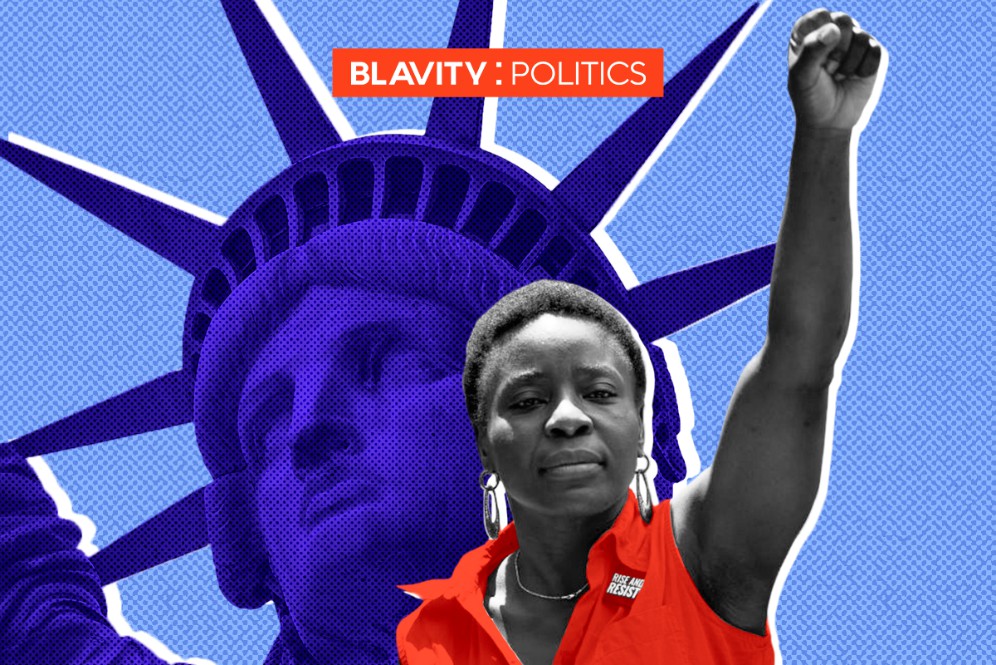Therese Patricia Okoumou’s sentencing hearing occurred on Tuesday, over her attempt to scale the Statue of Liberty last July 4, to protest of the separation of families at the U.S.- Mexican border. After being on house arrest, the Lady Liberty climber has been sentenced to five years of probation and 200 hours of community service. The courts charged her with trespassing, disorderly conduct, and interfering with the government.
With no jail time on the sentence, Okoumou is relieved. "I'm happy that I don't have to do jail time," Okoumou tells Blavity. "My concern with jail time was that I would have to go on hunger strike and there was a strong possibility that I was going to lose amounts of fiber and injure my organs. I'm so young and I want to fight not to that level." Okoumou came in the courtroom with clear tape over her eyes to make the statement that she wasn't going to be controlled. "I was ready to fight. You can see it when I put the tape covering my face. I came there making my statement. You will not take away my freedom of expression. You will not take away the rights given to me by the Constitution, to freely assemble."
Okoumou has also climbed the Eiffel Tower and the Southwest Key Detention Center in an effort to raise awareness on family separation and immigration policies at the U.S.-Mexican border. In the aftermath of her protests, there have been some signs of progress, including the resignation of Southwest Key CEO Juan Sanchez, who allegedly profited greatly as a result of Trump’s immigration policies, including receiving millions of dollars from the government for detaining children. Although Okoumou’s protests have helped gain attention to unjust immigration policies, she says that nothing has really changed, as children are still in cages.
“People think that just because Trump reversed his immigration policy, everything is fine now,” Okoumou said in an interview with Blavity. “He moved the beds and children to Homestead, Florida. Trump and the Department of Justice are not wearing shacks and monitors — I am.”
After photos of children in cages at the border were released, the images reminded Okoumou of her own experience with familial separation. When she was 2 years old and living in the Republic of Congo, her parents divorced. Her father remarried another woman shortly after, then took Okoumou and her siblings away. Whenever she was left in the care of her stepmother, Okoumou claims she endured abuse, and after also being taken from her mother, this inevitably led to much resentment.
“I had the eyes and the ears to crack — as a young girl — the wrong that was done to my family,” Okoumou said. “This woman, who had so much power and authority over my dad, myself and my siblings, was someone that I had to fight against.”
Okoumou continued to fight against any injustices that came her way. However, she had never gone to such heights to make a statement as she did when she attempted to climb the Statue of Liberty. Guided by God, she used the strength she acquired as a personal trainer to scale Lady Liberty, while her fellow protestors were caught by authorities below. When she took a seat at the top of the statue’s base, Okoumou wasn’t thinking about the tourists who weren’t able to buy souvenirs or even her own personal safety. Rather, she was more concerned about the safety of the trained and harnessed police officers who tried to get her down.
“That’s what you do as a true activist. When you are called upon the higher power to fulfill a mission — such as saving children in cages, being the voice for the voiceless — I had them in mind,” she told Blavity.
She also remembers reminiscing about her father’s job as a personal aviator as she sat at the base of Lady Liberty. As a child trying to emulate her father, Okoumou used to climb to the roof of the house, but no one ever called for her to come down.
After being physically brought down by the government, it seems like the U.S. court system is trying to bring Okoumou down again. She was found guilty of all three charges for her Statue of Liberty protest. In an emergency sentencing hearing, the judge ordered her to find a paying job that doesn’t involve activism. Okoumou thinks that the judge’s verified employment request was in response to the funds raised through her GoFundMe account for her survival. Instead of the government holding itself accountable for their participation in what essentially seems like concentration camps by a different name, Okoumou believes she is being seen as a dangerous threat whose protest put everyone at risk.
“[The government] doesn’t know how to deal with me. […] They want to stop me from enjoying my freedom of speech and being an activist," she said. "The prosecutor wants to give me one-month imprisonment, three years probation because they want to control my life. We will not give it to them."
When asked about how she will spend her time in probation and community service, she told Blavity that she's ready to speak to the youth about activism. "They're going to tell me where to direct my energy, I want to go to the schools, dedicate my time and attention to the young people who have been inspired by my act of bravery on the Fourth of July."
Now, check this out:
7 Ways You Can Help Black And Brown Immigrants Being Terrorized By The Trump Administration
What You Need To Know About Trump's Latest Threat Against Immigrants
